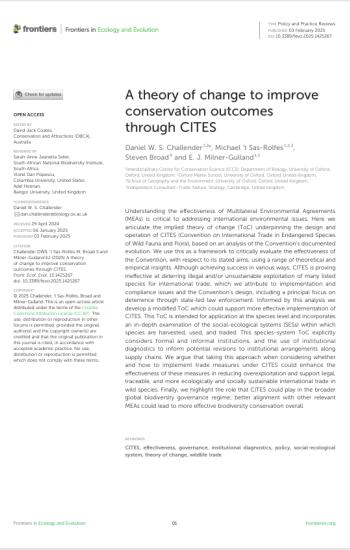
A theory of change to improve conservation outcomes through CITES
Here we articulate the implied theory of change (ToC) underpinning the design and operation of CITES (Convention on International Trade in Endangered Species of Wild Fauna and Flora), based on an analysis of the Convention’s documented evolution. We use this as a framework to critically evaluate the effectiveness of the Convention, with respect to its stated aims, using a range of theoretical and empirical insights. Although achieving success in various ways, CITES is proving ineffective at deterring illegal and/or unsustainable exploitation of many listed species for international trade, which we attribute to implementation and compliance issues and the Convention’s design, including a principal focus on deterrence through state-led law enforcement. Informed by this analysis we develop a modified ToC which could support more effective implementation of CITES.
Click here for an online version
Challender DWS, ’t Sas-Rolfes M, Broad S and Milner-Gulland EJ (2025) A theory of change to improve conservation outcomes through CITES. Front. Ecol. Evol. 13:1425267. doi: 10.3389/fevo.2025.1425267 https://doi.org/10.3389/fevo.2025.1425267
-

Dr Michael 't Sas-Rolfes
Research Associate -
Daniel Challender
-
E.J. Milner-Gulland
-
Steven Broad
We support the free flow of information. Please share:
More content
-

A theory of change to improve conservation outcomes through CITES
Dr Michael 't Sas-Rolfes…Here we articulate the implied theory of change (ToC) underpinning the design and operation of CITES (Convention on...
2025Research -

Wild Meat Value Chain Integration Systems: Opportunities for Value Chain Formalisation and Scaling in Africa
Dr Wiseman Ndlovu…Establishing legal, safe and sustainable wild meat sector promises to potentially reduce demand for illegally sourced meat, support...
2025Research -

AWEI's 2024 Wildlife Economy Dialogue Series
Ms Emily TaylorRediscover 2024: A year of insight and inspiration
In 2024, AWEI proudly hosted three ground-breaking dialogue series in…
Articles -
Evaluating key evidence and formulating regulatory alternatives regarding the UK's Hunting Trophies (Import Prohibition) Bill
Dr Michael 't Sas-Rolfes…We evaluate key evidence relating to the Hunting Trophies (Import Prohibition) Bill that was discussed in the UK...
2024Research -

The return of the UK's ill-conceived bill to ban hunting trophy imports
Prof Francis Vorhies…A recent report and poll reveal serious flaws in the UK government’s continued push to ban the importation…
Articles -

India’s Wildlife Economy: Balancing Conservation and Sustainable Use
Mathen ‘Rajeev’ MathewThe concept of a wildlife economy through the sustainable use of wildlife is increasingly recognised as a means…
Articles -

Leveraging free trade to boost Africa’s wildlife economies through wild-harvested products
Dr Wiseman NdlovuThe intra-Africa trade of wild products presents a unique intersection of economic opportunity and environmental conservation. With the...
2024Research -

Insights from the African Wildlife Economy Colloquium
Klarine SchutteThe inaugural African Wildlife Economy Colloquium, held from 4–6 November at Stellenbosch University, brought together a diverse group…
Articles -

Drivers of hunting and photographic tourism income to communal conservancies in Namibia
Mr Joseph Goergen …Hunting and photographic tourism provide ecosystem services that can facilitate conservation. Understanding factors influencing how tourism industries generate...
2024Research
Get updates by email
Through impactful research, stakeholder engagement, and professional development, AWEI is supporting the wildlife economy across Africa. Please subscribe for occasional updates on our work and forthcoming events.
Sign up for a quarterly dose of AWEI insights
In a complex and changing world, AWEI generates strategic ideas, conducts independent analysis on wildlife economies, and collaborates with global scholar-practitioners to provide training and expertise for biodiversity conservation, climate resilience, and inclusive economic opportunities in Africa.
